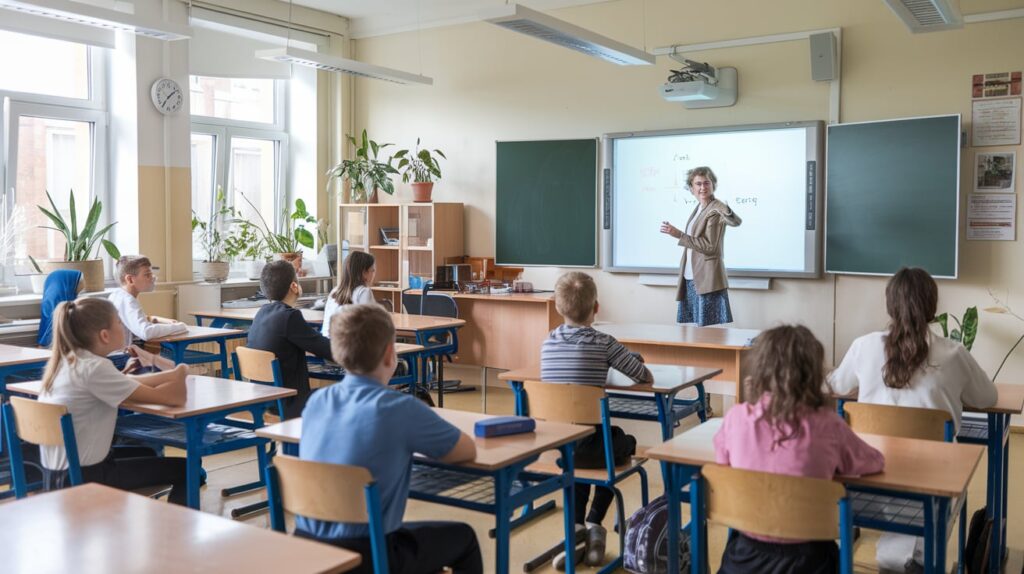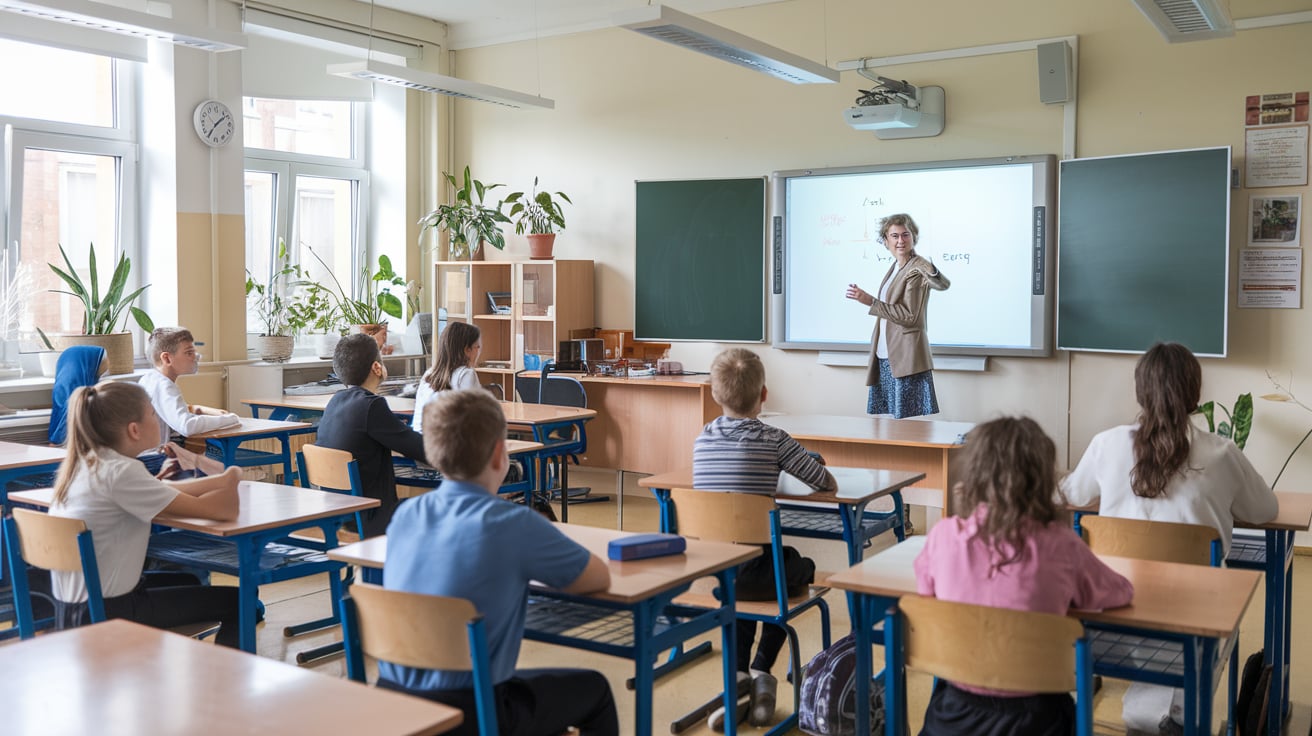
Help Kids Focus in Class: Solutions for Parents
Keeping our children focused in class is a big challenge for parents. Modern education and technology distractions make it hard for kids to stay on track. But, as parents, we can make a big difference in their success.
We’ll look at simple yet effective ways to help your kids stay focused. We’ll cover everything from understanding why they might not be paying attention to using mindfulness and positive thinking. You’ll get all the tools you need to help your kids do well in school.
Key Takeaways
- Identify the underlying causes of your child’s lack of focus in the classroom
- Establish a supportive home environment that encourages concentration and learning
- Incorporate mindfulness exercises to help your child calm their mind and increase their attention span
- Collaborate with teachers to create tailored learning plans and communication channels
- Encourage physical activity to boost energy, concentration, and overall well-being
- Address any learning disabilities or ADHD with professional assessments and targeted interventions
- Foster a positive mindset and celebrate your child’s small wins to build confidence and motivation
Understanding the Lack of Focus in Class for Our Children
As parents, we often wonder why our kids can’t focus in class. This problem affects their school work and happiness. Let’s explore why they might not pay attention and what distracts them in class.
Identifying the Causes of Inattention
There are many reasons why kids might not focus. Learning disabilities and ADHD are common causes. Kids with these issues might find it hard to understand or stay focused.
Children with ADHD might have trouble sitting still or paying attention. They might get distracted easily by what’s around them.
The Impact of Distractions in the Classroom
Classrooms are full of things that can distract kids. Peers talking and digital devices are big distractions. These things make it hard for kids to focus on their schoolwork.
When there’s too much going on, kids can’t stay on track. This affects their school grades and learning experience.
Knowing why kids have trouble focusing and what distracts them helps us support them better. We can make their home environment better and find ways to help them focus in class.
Establishing a Supportive Home Environment
Creating a nurturing and focused environment at home can greatly help a child with attention deficit and concentration issues. As parents, we are key in shaping the conditions that support learning and growth.
Setting up a dedicated study space without distractions is crucial. Choose a quiet, well-lit area with all the tools your child needs. This space tells your child it’s time to focus and be productive.
Structured routines are also important. Create a schedule for homework, study time, and breaks. This predictability helps manage behaviour and supports learning.
- Encourage regular breaks and physical activity to recharge and refocus.
- Limit digital distractions by setting boundaries around screen time.
- Foster an atmosphere of calm and positivity, where your child feels supported and motivated to learn.
Every child is different, so what works for one might not work for another. Stay flexible and open to changes. Keep talking to your child to understand their needs. A supportive home environment is key to their success and well-being.
Incorporating Mindfulness Techniques
As parents, we know how vital it is to help our kids stay focused in class. Mindfulness techniques are a great way to do this. They can really help with behaviour and school work.
Breathing Exercises for Increased Concentration
Breathing exercises are a simple yet powerful tool for focus. Encourage your child to do deep, rhythmic breathing each day. It helps calm their mind, lowers anxiety, and manages emotions in class.
- Teach them the belly breathing technique, where they slowly inhale through their nose and feel their abdomen expand, then exhale through their mouth, allowing their belly to contract.
- Try the 4-7-8 breathing method, where they inhale for 4 seconds, hold the breath for 7 seconds, and exhale for 8 seconds. Repeat this cycle a few times.
Guided Visualisation for Calmness
Guided visualisation is another mindfulness technique that helps kids feel calm and peaceful. Ask them to close their eyes and imagine a calm place, like a beach or forest. This can reduce stress and help them relax, making it easier to focus in class.
“Mindfulness is not about clearing your mind – it’s about paying attention to the present moment with kindness and curiosity.”
Adding these mindfulness practices to your child’s daily routine can greatly improve their focus and behaviour. By teaching them these skills, you’re giving them tools to handle classroom challenges and more.
Lack of focus in class for our children
As parents, we know how hard it is for our kids to stay focused in school. Problems like attention deficit and distractions can make learning tough. It’s tough to see our children struggle with their studies.
Not being able to focus affects many areas of a child’s life. It can hurt their schoolwork, social skills, and personal growth. When they can’t pay attention, they might miss important lessons and struggle to remember things. This can make them feel frustrated and doubt themselves.
Also, not being able to focus can make it hard for kids to make friends. They might find it hard to join in with others or work together. This can stop them from learning important social skills and making real friends.
It’s very important to help our kids stay focused in class. This is key for their success in school and their happiness. By finding out why they struggle and using good strategies, we can help them reach their goals.
TO WATCH VIDEO CLICK HERE
Collaborating with Teachers and School
As parents, we are key to our kids’ education. Working closely with teachers and the school helps our children succeed. It’s all about keeping lines of communication open and creating learning plans that fit each child’s needs.
Open Communication Channels
It’s crucial to talk regularly with your child’s teacher. Attend parent-teacher meetings and reach out when you have something to say. This way, you can stay updated on your child’s progress and tackle any problems together.
Tailored Learning Plans
Every child learns differently. By teaming up with teachers, you can get learning plans that match your child’s abilities. This might mean adjusting the curriculum or using special tools to help them learn.
For kids with learning disabilities or ADHD, a personal touch makes a big difference. Working with the school ensures your child gets the right support. This helps them do well in school and develop important skills for the future.
Encouraging Physical Activity
Keeping kids active is key for their health and learning. It helps them do better in school and stay focused. Regular exercise is important for their behaviour and concentration.
Research shows that exercise boosts kids’ brains and moods. It helps them manage their energy and focus better. Plus, it teaches them healthy habits for life.
Benefits of Regular Exercise
- Improved focus and attention span
- Enhanced problem-solving skills and creative thinking
- Reduced symptoms of ADHD and other behavioural issues
- Increased self-confidence and overall well-being
Encourage your child to try different activities like playing outside, sports, or dance. Even simple games can help. These fun activities help them release energy, feel better, and enjoy moving.
By making exercise a daily habit, you help your child succeed in school and grow healthy. It’s a great way to teach them lasting habits.
Addressing Learning Disabilities and ADHD
For many kids, staying focused in class is hard. Some just get distracted easily. Others might have learning disabilities or ADHD. These issues can make it tough for them to do well in school.
Professional Assessments and Interventions
If you think your child might have a learning problem or ADHD, get a professional check-up. This test can show what your child needs help with. Experts like psychologists and paediatricians can help make a plan just for them.
They work with you and your child’s school to find the best ways to support them.
Behaviour Management Strategies
Parents can also help their kids with learning disabilities or ADHD. Here are some ways:
- Make clear routines and schedules to help them feel secure.
- Use activities that help them focus better.
- Work with teachers to make learning plans that fit your child.
- Help them stay active to help them focus.
- Always praise them for their efforts and small wins.
By getting professional help, making plans, and using good behaviour strategies, kids can do better in school. Parents play a big role in helping them succeed.
Fostering a Positive Mindset
Helping kids stay focused in class starts with a positive mindset. Celebrating their small wins helps build a growth mindset. This mindset lets them tackle challenges and keep going, even when it’s tough.
Celebrating Small Wins
It’s key to notice and celebrate your child’s progress, no matter how small. Praise their hard work and achievements. Let them know they should be proud of what they’ve done.
This positive feedback boosts their confidence and motivation. It encourages them to keep trying and stay focused in class.
Teaching a growth mindset is also vital. It changes the way they see challenges. Instead of seeing them as barriers, they see them as chances to learn and grow. This mindset helps them be more resilient and open to new challenges.
FAQ
How can I help my child focus better in the classroom?
There are many ways to help your child focus in class. Start by creating a supportive home environment. This means having a dedicated study space and regular study routines.
Try mindfulness practices like breathing exercises and guided visualisation. Work with teachers to address any learning disabilities or ADHD. Make sure your child gets enough physical activity to improve concentration.
Also, celebrate their small achievements and encourage a growth mindset. This helps them stay positive and focused.
What are the common causes of lack of focus in class for children?
Several factors can cause a lack of focus in class. Learning disabilities or ADHD are common issues. Environmental distractions like noise and technology can also be a problem.
Boredom or disengagement from lessons can lead to distraction. Poor sleep, nutrition, or physical activity habits can also affect focus. Mental health or emotional issues can also play a role.
How can mindfulness techniques help improve my child’s concentration?
Introducing mindfulness into your child’s daily routine can greatly improve focus. Simple breathing exercises and guided visualisations can help. They reduce anxiety and promote calmness and wellbeing.
What should I do if I suspect my child has a learning disability or ADHD?
If you think your child might have a learning disability or ADHD, get a professional assessment. This will help create a tailored learning plan. It also ensures access to necessary support and interventions.
Behaviour management strategies can help manage challenges. This is especially true for these conditions.
How can I encourage a positive mindset in my child to help them focus in class?
Encouraging a positive mindset is key for your child’s success. Celebrate their small achievements and encourage a growth mindset. This helps them stay motivated and focused.
Create an environment that supports and motivates them. This will help them overcome challenges and stay focused in class.
TO SEE MORE TOPICS CLICK HERE



